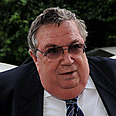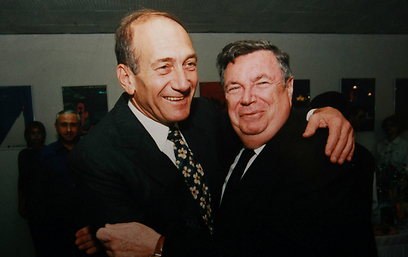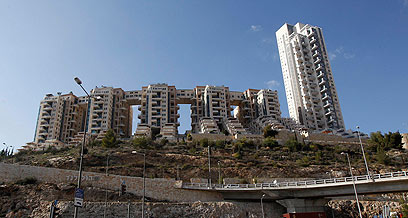
State witness in Holyland case revealed
Financial genius, master manipulator or a businessman down on his luck? Prosecution reveals identity of Shmuel Dechner, its key witness against former Prime Minister Ehud Olmert
Shmuel Dechner, 75, who died last Thursday, was the State witness against former Prime Minister Ehud Olmert in the Holyland corruption case, the State Prosecutor's Office revealed Tuesday.
Dechner's identity was never released to the media during the trial, in order to protect his identity, as is customary when an individual involved in a criminal case turns State witness.
Related stories:
- State's witness in Holyland case dies
- State in jam following Holyland witness' death
- 'Holyland case may be reexamined'
His death has thrown the prosecution's case. Senior legalists said that since the testimony could not be completed the court would have to rule it as inadmissible, which may force the State to withdraw the indictment altogether.
The prosecution, for its part, asked the court for a continuance, saying it would still pursue a conviction.
Financial genius, master manipulator
Born in 1937 in Romania, Dechner came to Israel in 1950. He studied economics and microbiology at the Hebrew University in Jerusalem and later got his MBA at Century University in Los Angeles. He married and had two daughters.
Dechner had the reputation of a financial genius and an accountancy wizard, who knew how to spin any bottom line while shrewdly covering his tracks.
During the trial he was described as a sophisticated businessman and a master manipulator, who had a knack for landing on his feet, no matter how murky the situation was.
Dechner was intimately familiar with the ins and outs of the political and financial systems and had a reputation as a man who knew exactly which strings to pull in his favor.

Dechner with Olmert (Reproduction: Yariv Katz)
Dechner's career path is riddled with stints in some of Israel's top institutions and companies, including the Weizmann Institute of Science, Rassco (Rural and Suburban Settlement Company), the Clal Concern and its leading subsidiary Azorim Construction.
After 10 years with Clal and Azorim Dechner decided to set up his own financial investment firm. Maagarim, which was the parent company of four subsidiaries, would soon become an empire worth over $100 million, whose meteoric rise into financial stardom inspired awe within Israel's conservative business and financial communities.
The higher they rise, the harder they fall
Maagarim rose to fame at the height of the Israeli financial boom of the early 1980s, when the Tel Aviv Stock Exchange could do no wrong. Dechner had a voracious appetite for big – and sometimes shady – deals. Many thought he was careless, but in 1983 he was hailed as the "golden boy" of the financial sector.
Mid 1983 however saw the stocks of the four largest banks in Israel collapse, sending the economy into a tailspin.
The Maagarim bubble burst and Dechner soon found himself battling huge debts and numerous creditors. His associates said he remained unfazed by the situation. "Sometimes you're on top and sometimes you're on the bottom," he said in a 1984 interview.
The Israel Securities Authority, however, was less than impressed - and launched an investigation into his dealings. The inquiry decimated his reputation, and he left Israel for London.
Many assumed at the time that he fled the country in an attempt to escape further prosecution by the police and Tax Authority.
While in London, Dechner served as the financial advisor to tycoon Leon Tamman. His taste for big business had not faded and he bought buy 20% of a local baking conglomerate.

The Holyland complex (Photo: Reuters)
Dechner's investment failed and the company went into receivership, and as if the financial blow was not hard enough, the Scotland Yard launched an investigation against him for alleged embezzlement.
Dechner returned to Israel. "I'm not a thief and I'm not in hiding. I'm simply penniless," he told Yedioth Ahronoth at the time.
Reversal of fortunes
With two colossal financial failures to his name and an endless list of creditors, Dechner attempted to get back on his feet.
In the early 1990s he was contracted by businessmen Hillel Chernoy to promote a budding real estate endeavor stretching across 30 acres in southwest Jerusalem.
The plan was to build a luxury apartment complex on one of the mountains overlooking the capital. The area was known to all as "Holyland."
The plan, however, would require changing the area's landscape via the construction of tower blocks, in what would later be described as "an unprecedented volume."
Dechner was hired in order to promote the area's rezoning from that of a business zone to that of a residential zone, which would dramatically increase the number of units Chernoy would be able to put up, as well as to reduce the latter's expenditures on the project.
Dechner reportedly knew from his own past experience that the area's rezoning would require the solid support of high-ranking city officials in the Jerusalem Municipality.
According to the indictments filed in the Holyland case nearly 20 years after Dechner was introduced to the construction plan, he stopped at nothing to ensure the support of the City, whose mayor at the time was Ehud Olmert.
The mean to the goal was simple - money - and Dechner, by his own admission in court, had very deep pockets; paying for city officials' various personal expenses, paying off debts, funding campaigns and even buying expensive jewelry. "I was greasing the wheels as needed," he told the court.
According to the State, the project developers paid millions in bribes to a long list of city and public officials.
The Prosecution filed charges against 18 people in the case, including Olmert, former Jerusalem Mayor Uri Lupolianski, former Bank Hapoalim CEO Dan Dankner and 13 others.
After years of working together, Chernoy and Dechner had a falling out and emerged as bitter rivals. Dechner's other business ventures began falling apart as well and he again found himself hounded by creditors.
In his desperation, he decided to open the proverbial Pandora's Box: The police were in the midst of an undercover investigation into the Holyland project and when it became and official open investigation, Dechner became the State's key witness.
He presented investigators with various records, files and lists he kept over the years, allegedly detailing the nefarious transactions implication Olmert. Those, however, would later be debunked; undermining his testimony, as well as the State's other evidence in the case.
- Receive Ynetnews updates directly to your desktop










